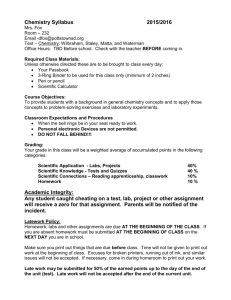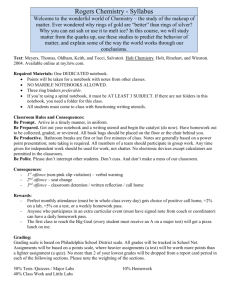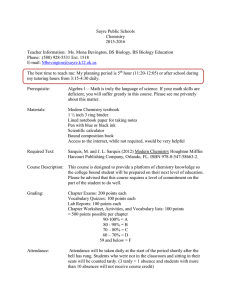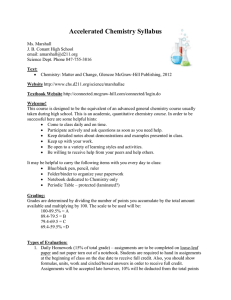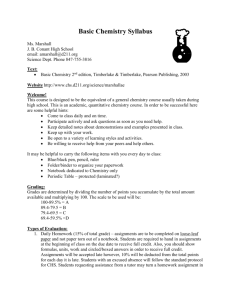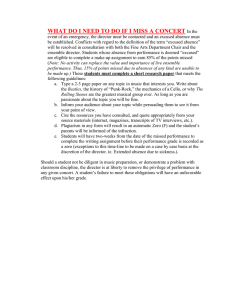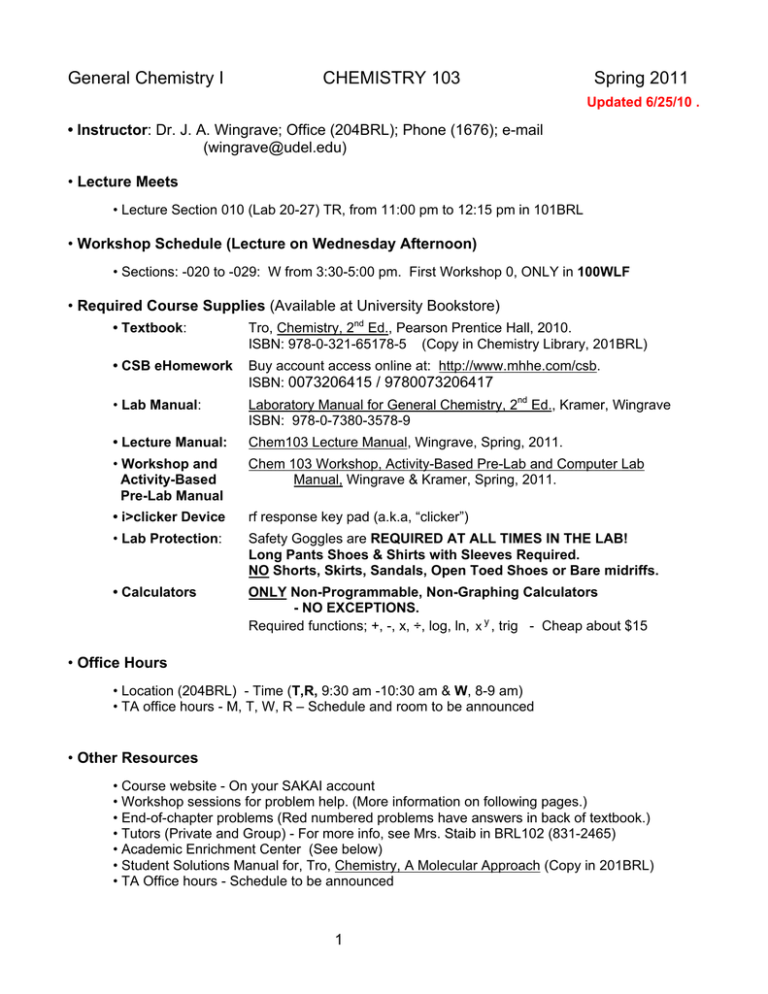
General Chemistry I
CHEMISTRY 103
Spring 2011
Updated 6/25/10 .
• Instructor: Dr. J. A. Wingrave; Office (204BRL); Phone (1676); e-mail
(wingrave@udel.edu)
• Lecture Meets
• Lecture Section 010 (Lab 20-27) TR, from 11:00 pm to 12:15 pm in 101BRL
• Workshop Schedule (Lecture on Wednesday Afternoon)
• Sections: -020 to -029: W from 3:30-5:00 pm. First Workshop 0, ONLY in 100WLF
• Required Course Supplies (Available at University Bookstore)
• Textbook:
Tro, Chemistry, 2nd Ed., Pearson Prentice Hall, 2010.
ISBN: 978-0-321-65178-5 (Copy in Chemistry Library, 201BRL)
• CSB eHomework
Buy account access online at: http://www.mhhe.com/csb.
ISBN: 0073206415 / 9780073206417
• Lab Manual:
Laboratory Manual for General Chemistry, 2nd Ed., Kramer, Wingrave
ISBN: 978-0-7380-3578-9
• Lecture Manual:
Chem103 Lecture Manual, Wingrave, Spring, 2011.
• Workshop and
Activity-Based
Pre-Lab Manual
Chem 103 Workshop, Activity-Based Pre-Lab and Computer Lab
Manual, Wingrave & Kramer, Spring, 2011.
• i>clicker Device
rf response key pad (a.k.a, “clicker”)
• Lab Protection:
Safety Goggles are REQUIRED AT ALL TIMES IN THE LAB!
Long Pants Shoes & Shirts with Sleeves Required.
NO Shorts, Skirts, Sandals, Open Toed Shoes or Bare midriffs.
• Calculators
ONLY Non-Programmable, Non-Graphing Calculators
- NO EXCEPTIONS.
Required functions; +, -, x, ÷, log, ln, x y , trig - Cheap about $15
• Office Hours
• Location (204BRL) - Time (T,R, 9:30 am -10:30 am & W, 8-9 am)
• TA office hours - M, T, W, R – Schedule and room to be announced
• Other Resources
• Course website - On your SAKAI account
• Workshop sessions for problem help. (More information on following pages.)
• End-of-chapter problems (Red numbered problems have answers in back of textbook.)
• Tutors (Private and Group) - For more info, see Mrs. Staib in BRL102 (831-2465)
• Academic Enrichment Center (See below)
• Student Solutions Manual for, Tro, Chemistry, A Molecular Approach (Copy in 201BRL)
• TA Office hours - Schedule to be announced
1
General Chemistry I
CHEMISTRY 103
Spring 2011
Updated 6/25/10 .
• Laboratory Safety Exam – REQUIRED eEXAM
• All students MUST complete the EHS Safety Training on the Web: “Basic Right-To-Know
Safety Training for Undergraduate Teaching Laboratory Students”, before they are allowed
in lab. Access training at: http://www.udel.edu/ehs
• Students will be allowed in lab ONLY AFTER they hand their safety training certificate to TA.
• Laboratory
• Lab meets once a week. - First Lab meets Monday, February 14, 2011.
• Report to lab promptly each week in order to hear lab instruction presentation by TA.
• Due as you ENTER lab each week;
- A Written Lab Procedure
- An MSDS (from sections 1, 2 and 3) analysis for two chemicals used in that week’s lab.
• Due as you LEAVE lab each week are ABPL Pre-Lab, Lab and Post Lab reports.
• Activity-Based Pre-Labs (ABPL) - short lab experiments done collaboratively at start of
lab in groups of 4 students.
• Labs and make-up labs can only be done during the week scheduled AND with a lab pass.
• Make-up Labs - See Professor Wingrave (Ms. Cowgill in 104BRL) for a lab pass.
• Missed labs will be either EXCUSED or UNEXCUSED.
- A score of zero (0) will be recorded for an UNEXCUSED LAB (AND Pre-Lab).
- No score will be recorded for an EXCUSED LAB.
- An EXCUSED LAB requires an acceptable note given to TA from parent or doctor.
• IMPORTANT - Each Unexcused missed lab will lower your lab score.
- Each Excused missed lab will NOT affect your lab score.
- An excessive number of missed labs (excused OR unexcused) will
result in an incomplete grade for chem103S11.
• Safety Goggles - Must have either “ANSI” or “AS/NZS” on the lenses.
• MSDS Link: http://www.mallbaker.com/Americas/catalog/default.asp?searchfor=msds
• Lab is an inseparable part of chem103. Lab grade is part of your chem103 grade.
• NOTE: Excessive number of missed labs will result in an incomplete grade for chem103S11.
• Quizzes (i>clicker) – In Lecture
• There will be 4 quiz questions per week and your i>clicker device (clicker) is
REQUIRED FOR CREDIT.
• Quizzes will be an open-book problem working session.
• All quizzes will be summed together for a total of 40 points over the course of the semester.
• If half or more of the quiz questions are answered correctly, a quiz grade of 40 will be earned.
• No make-ups & no credit earned if absent OR if i>clicker response device (‘clicker”) doesn’t
work.
• Answer ONLY with your own ‘clicker’. Do NOT answer with more than one ‘clicker’.
• Answering with more than one ‘clicker’ constitutes a breach of academic ethics and will result
in a zero Quiz Score.
2
General Chemistry I
CHEMISTRY 103
Spring 2011
Updated 6/25/10 .
• ChemSkill Builders (CSB) – Electronic Homework
• Purchase a CSB account online. Not available at bookstore.
• Open CSB site by logging on to http://www.mhhe.com/csb.
• IF: You had a chem103 CSB account in a previous semester (good for 12 months):
- Log onto your old chem103 CSB account and click on “Account Information”,
- Fill in course (chem103s11), Professor (Wingrave) and lab section (040L, 051L,
060L, etc.) number then you’re ready to LOGIN and start working problems.
• IF: You do NOT have a chem103 CSB account:
- Click on “Purchase ChemSkill Builder”, and purchase a CSB.account.
- After purchasing a CSB account, open CSB site and click “New Student
Registration”.
- Fill in course (chem103s11), Professor (Wingrave) and lab section (040L, 051L,
060L, etc.) number.
- Create your own password and you’re ready to LOGIN and start working
problems.
• Units are divided into sections, each section consisting of 10-20 problems, requiring
~2 hours.
• Each section can be worked and reworked but ONLY highest section score will be
recorded.
• Computer will randomly change problems in each section each time a section is
reworked.
• CSB SECTIONS ARE DUE AT EACH EXAM AND FINAL EXAM. FOR ASSIGNED
SECTIONS: See “Topics for Exams” on SAKAI website.
• Workshops, Wednesday 3:35-5:00 pm
• Workshops will be held each Wednesday except exam weeks.
• Workshop problems will be worked from the Workshop and Pre-Lab Manual.
• Workshop problems are taken from old exams given by Profs. Kramer and Wingrave.
• First Workshop - Workshop 0 in 131SHL on February 9.
• ALTERNATE-TIME WORKSHOPS – Scheduled ONLY during Workshop 0.
• A total of forty (40) points TOTAL for the whole semester are possible.
• WORKSHOP GRADE – Based on group work. No credit for working by yourself OR
working problems prior to Workshop.
• MAKEUP WORKSHOPS – Only for EXCUSABLE absences.
- Work all Workshop problems you missed prior to next Workshop.
- Next Workshop show your Workshop Leader:
1. the worked problems you missed and,
2. a note explaining why you missed the previous Workshop.
- If work and note are satisfactory, Workshop leader will give credit for the
Workshop you missed.
• DATES: See Schedule below
ROOMS: To be announced
3
General Chemistry I
CHEMISTRY 103
Spring 2011
Updated 6/25/10 .
• Web Resources
• Chem103S11 Website on your SAKAI account
• Academic Enrichment Center Group Tutoring Session
• Location and Time - TBA
• Exams
• Three (3) in-class exams will be given. No make-up exams will be given.
• Missed exams will either be:
- UNEXCUSED – An exam score of zero (0) will be recorded.
- EXCUSED – Final exam score will replace an excused/missed exam(s).
Requires a note from parent or doctor to be given to professor.
• Lowest exam score will be replaced by final exam score. An EXCUSED exam
score will be considered a “lowest exam score”.
• Exams Cover: textbook, lecture, laboratory, CSB, i>clicker, Workshop & Lecture
Manual material.
* Exam corrections must be made prior to next exam.
• You will need ONLY a pen/pencil and non-programmable calculator for an exam.
• Everything except a pen/pencil and a non-programmable calculator must go to the
front of the exam room prior to the start of the exam.
• “Everything else” includes but is not limited to: book bags, clothing, cell phones &
other electronic devices, books, notebooks, scratch paper, calculator lids etc.
• Possessing items during an exam OTHER THAN a pen/pencil and a nonprogrammable calculator constitutes a breach of academic ethics and will result
in a zero score for the exam in question.
• Exams for regrading must be received by the professor before the subsequent exam.
• An exam regrade will constitute a regrade of the ENTIRE exam by the professor.
• The FINAL EXAM will be given on the date scheduled by the University.
NO EARLY OR LATE FINAL EXAM will be given for any reason. The makeup
exam date(s) will be announced after the start of the semester.
• MAKEUP FINAL EXAM DATE(S) will be scheduled after the end of the semester and
announced during the semester.
• Makeup Final Exams given by Reservation ONLY in, July, 2011 and September,
2011. Contact Prof. Wingrave.
• An Excessive Number of MISSED LABS or a MISSED FINAL EXAM will result in a
grade of “INCOMPLETE” for chem103S11.
• An “INCOMPLETE” grade in chem103S11 converts to a grade of “F” in
September, 2011.
4
General Chemistry I
CHEMISTRY 103
Spring 2011
Updated 6/25/10 .
• Minimum requirements for obtaining a passing grade in CHEM-103S11 are:
• Successful completion of all twelve (12) laboratory experiments.
• Successful completion of the final examination
• Earning a total of at least 400 points on the “Grading Schedule” outlined below.
• MISSED FINAL EXAM or Excessive Number of MISSED LABS (EXCUSED plus
UNEXCUSED MISSED exams) will result in a grade of “INCOMPLETE” for
chem103S11.
• An “INCOMPLETE” grade in chem103S11 converts to a grade of “F” in
September, 2011.
• Tentative Grading Scheme
• Three Examinations
( 3 x 120 points, 45 %)
• Laboratory Grade
( 200 points, 25 %)
• Final Examination
( 120 points, 15 %)
• CSB eHomework
( 40 points, 5%)
• Workshops
( 40 points, 5%)
• Quizzes in Lecture
( 40 points, 5%)
• Midterm Grade Will Be Estimated from Exam #1 Grade – ONLY – No Lab Grade !
• If You Have No Exam #1 Score, Your Midterm Grade Will Be An "N".
TTL POINTS (%) GRADE
800-720 (90)
720-700 (88)
700-675 (84)
675-625 (78)
A
AB+
B
TTL POINTS (%)
625-600 (75)
600-575 (72)
575-500 (63)
500-475 (59)
5
GRADE
BC+
C
C -
TTL POINTS (%)
475-450 (56)
450-425 (53)
425-400 (50)
400-0
GRADE
D+
D
DF
General Chemistry I
CHEMISTRY 103
Spring 2011
Updated 6/25/10 .
Tro
1
1
1
2,3
3
Lecture Topics & Number
20
20
20
4
4,12.5
4,15
0. Syllabus
1. Graphs & Uncertainty
2. Density, Temperature, Sig. Figs., Dimensional Analysis, Statistical Analysis
3. Sub-Atomic Particles, Atoms, Molecules, Ions, Periodic Table
4. Periodic Table. Inorganic Nomenclature, Balancing Chemical Equations
5. % Composition, Empirical & Chemical Formulas, Limiting Reagents & Yields,
Hydrates
6. Organic 1 Hydrocarbon Nomenclature and Isomers
7. Organic 2 Functional Groups & Common Names
8. Organic 3 Polymer Nomenclature
9. Electrolyte Strength, Solubility, Net Ionic Equations, Molarity Calculations
10. Concentration Units & Conversions
11. Dilution, Neutralization & Strong Acids/Bases, pH
15, 16
12. Chemical Equilibrium, Weak A/B, K eq , Salt Hydrolysis, Buffers & Titration
3
7,8
9, 10
13
17
6
17
18
18
Green
13. Light, Spectroscopy, Quantum Mechanics, Atomic Orbitals, Electron
Configuration, Electronegativity, Polarity
14. Lewis & VSEPR Structure, Formal Charge
15. Kinetics
16. Thermodynamics 1 - Thermodynamic Variables & Laws.
17. Thermodynamics 2 – Calorimetry
18. Thermodynamics 3 – Formation Property Calculations
19. ElectroChemistry 1 - Half Reactions, Redox Equations, Oxidation Numbers
20. ElectroChemistry 2 – Voltaic Cells & Nernst Equation and Band Theory
21. Environmental Chemistry
FINAL EXAM
6
CSB
-1
2
2
3, 4.1-3
4.4-6
24.1,2,6
24.1,2,6
25.1,2
5.1-5
6.1-4
18
17.1, 19.1-4
9, 12.1
12
16.1-3,5
21.1-4
8
21.1-4
5.6,10
22
---
General Chemistry I
CHEMISTRY 103
Spring 2011
Updated 6/25/10 .
• Lab, Exam and Workshop Schedule
Week of
Wk
2/6
1
Experiment Subject
NO LAB
2
2/13
2
Lab Safety
1) Lab#1 – Lab Techniques
2/20
3
2) Lab#2 - Density
2/27
4
3) Lab #3 - Physical & Chemical Properties
3/6
5
4) Lab #5 - Properties of Hydrates
3/13
6
5) Lab #6 - Limiting Reagents
3/20
7
6) Lab #32 - Phosphates in Water
with Statistical Data Analysis
3/26 to
4/3
8
4/3
9
7) Lab #27 Vitamin C Analysis
with Computer Data Analysis
4/10
10
8) Lab #13 - Types of Reactions
4/17
11
9) Lab #19 - Equivalent Weight
with Statistical Data Analysis
4/24
12
10) Lab #10 - Spectroscopy
5/1
13
11) Lab #11 – Lewis Structures
5/8
14
5/15
15
15
SPRING BREAK – NO LAB
3 / 26 - 4 / 3
12) Lab #15 – Calorimetry
with Computer Data Analysis
Last Lecture 5/19
FINAL EXAMS 5/18-5/25
7
Workshop
Workshop 0
2/9
Workshop 1
2/16
Workshop 2
2/23
Workshop 3
3/2
Workshop 4
3/9
Exam #1
3/16
Workshop 5
3/23
No Workshop
Workshop 6
4/6
Exam #2
4/13
Workshop 7
4/20
Workshop 8
4/27
Workshop 9
5/4
Exam #3
5/11
BASIC MATH FUNCTIONS
A. Exponents
1. x 2 x 3 x 2 3 x 5
5.
2. x 5 y 5 x y 5
6.
3. x 3 y 4 x 3 y 4 y x 3 y 3 yx y
4.
x
2 5
x
1
6 2
x
log 1000 3.0
ln 1000 6.91
x6
12. tan
6 3
x2
x
6 2
x3
x5
x
3
1
x4
x 53 x 2
10 3 10 log1000 1000
e 6.91 e ln1000 1000
H
10 pH
5. ln x 6 6 ln x
6. ln x 2.303 log x
7. log xy log x log y
y
8. log
log y log x
x
9. log x y log x y
10. sin
x
4
7. x
3
8.
3. pH log H
4. log x 7 7 log x
1
3
x6
2 5
x
x 10
B. Logs
1.
2.
3 6
h
a
b
opposite
a
1
hypotenuse
h
sec
11. cos
1
sin a h a
opposite a
adjacent b cot cos h b b
adjacent
b
1
hypotenuse
h
csc
13. 1 sin 2 cos 2
1. C
d 2 r Circumference of circle
2
6. A 6 L 2 Area of cube
r 2
d
Area of circle
4
7. V L 3 Volume of cube
2 r L Area of cylinder
4 3
8. V
4 r 2 Area of sphere
r
Volume of sphere
3
1
9. V r 2 L Volume of cylinder
b h Area of RIGHT triangle
2
D. Mensuration:
2. A
3. A
4. A
5. A
E. Quadratic Equation
:
ax 2 bx c 0
8
x
b
b2 4ac
2a

